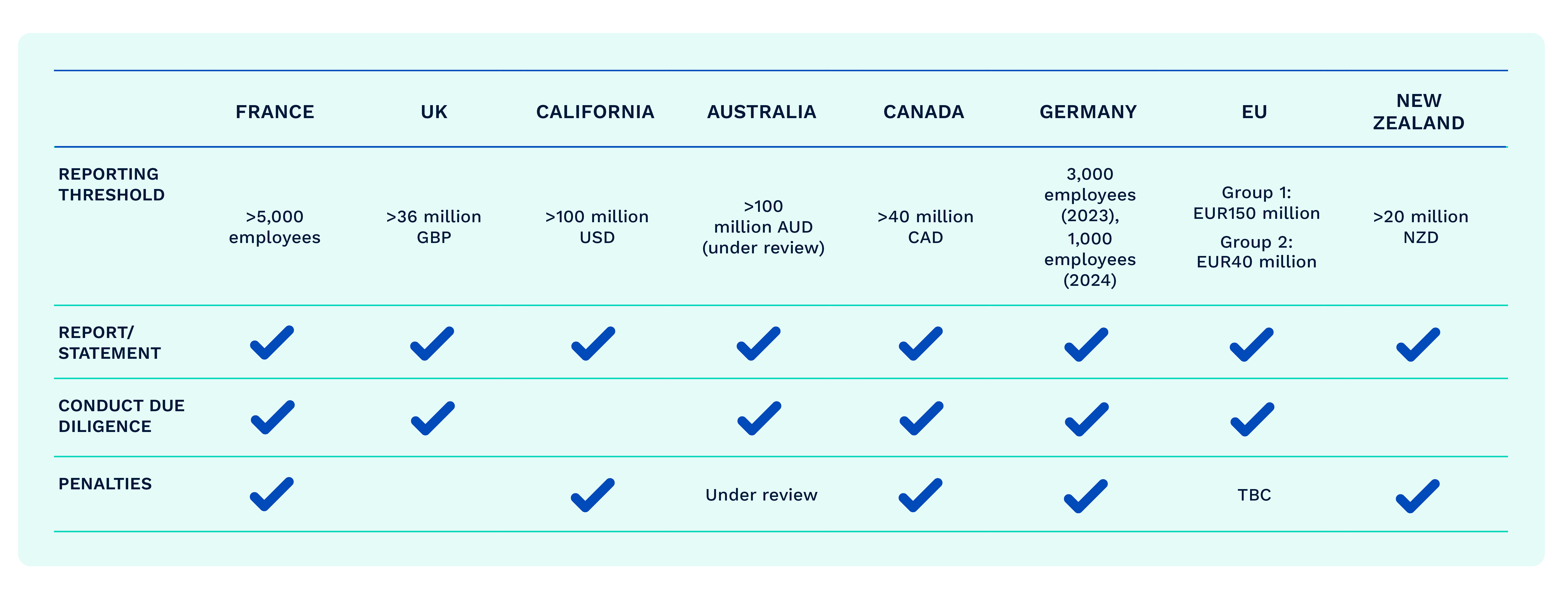Underpinning a successful environmental transition to a circular economy, legislators are also starting to recognise that people and communities play a crucial role in making this shift.
Since the globalisation of supply chains began, businesses and organisations have not prioritised transparency to understand who is making their products, and what conditions these workers have been subject to. One such example happened In 2013, when the world was shocked to discover that garments were being subcontracted to factories in Dhaka, Bangladesh. The building in Rana Plaza, which housed many subcontracted garment factories went unseen by all brands, and due to insufficient building conditions, collapsed, subsequently killing over 1,100 people. Then again, nearly a decade after the Rana Plaza disaster, stories of forced and slave labour emerged from Xinjiang, China where Uyghur people have been reportedly detained, and forced to work for little to no pay, and under inhumane conditions, to produce products such as tomatoes and/or cotton.
However, slavery and forced labour has not only been found in the manufacturing countries around the world, they have also been reported in our home countries. According to the latest Global Slavery Index, released by Walk Free, there are currently over 41,000 people in Australia, and 8,000 people in New Zealand living in slavery, with over 50 million people globally.
In Australia, there have been many cases of modern slavery reported, but very few convictions. Between 2004 – 2019, only 24 offenders were convicted, but there were over 462 victims referred to the Australian Government’s Support for Trafficked People Programme. Cases of modern slavery in Australia have been reported as late as July this year. And in New Zealand, our reliance on migrant and temporary workers to help our agricultural sector at peak harvesting periods, has led to an increase of modern slavery cases. In 2020, a man was convicted of 13 counts of dealing in slaves, and 10 counts of human trafficking, costing him 11 years in prison.
Businesses have been very slow to step up and uphold human rights through their operations and supply chains. As a result, governments are now taking charge and starting to impose legislation that require businesses to conduct effective due diligence, ensuring the wellbeing and safety of people all over the world.
In this article, I have summarised some of the latest key regulations that have been introduced, that could affect your business, especially if you export goods internationally. These new regulations join already existing legislation in France, California, the UK and Australia by ensuring businesses conduct due diligence, gain transparency and combat the existence of slavery and forced labour. This is not an exhaustive list, but will give you an oversight of some of the key legislative frameworks that may affect them.
In mid-2022, the US government introduced the Uyghur Forced Labor Prevention Act (UFLPA). The Act was implemented to help reduce the amount of goods flowing into the US from the People’s Republic of China, especially from the Xinjiang Uyghur Autonomous Region, or Xinjiang.
Earlier this year, Canada passed Bill S-211, officially known as the “Fighting Against Forced Labour and Child Labour in Supply Chains Act.” The Act applies to entities operating in the Canadian market with revenue of over $40 million. Entities must submit and publish an annual report that must identify the risks of modern slavery within their supply chains and the steps taken to mitigate them.
Also this year, Germany adopted the Act on Corporate Due Diligence in Supply Chains. Through this act, companies operating in Germany with at least 3,000 employees in 2023, and 1,000 employees in 2024, must identify risks of human rights violations and environmental risks of their direct suppliers, and take steps to prevent and remedy these risks. Companies must also start to understand the risks of their indirect suppliers. A company could be fined up to 2% of their average yearly global revenue, or up to €800,000 for non compliance.
The EU have set out the EU Corporate Sustainability Due Diligence Directive (CSDDD). Through this legislation, businesses are responsible for integrating due diligence and risk assessments through their supply chain, to identify and mitigate any human rights or environmental issues. Although the directive is not said to be in force until 2024-25, this legislation will have a great effect on New Zealand and Australian businesses who are operating in the EU, especially if they are supplying goods to larger retailers.
The EU Commission are also currently working on adopting the Prohibiting Products Made with Forced Labour on the Union Market Regulation (PPMFLR), which would prohibit products made with the use of forced labour. The state members will use a risk-based approach and assess the forced labour risks for each geographic region. Authorities can request information from companies and carry out checks to ensure products have not come from high-risk regions.
And, for what seems like a decade in the making, New Zealand is finally drafting its first Modern Slavery legislation. In late July 2023, the New Zealand government announced that it was beginning to draft modern slavery legislation that would impact businesses with more than $20 million in revenue. Businesses in New Zealand would be required to provide information to a modern slavery register, on how they have identified and tackled modern slavery risks in their operations and supply chains. There would be penalties for non-compliance of between $10-200,000 NZD. We hope to see this legislation published in early 2024.
On another good note, Australian authorities are currently reviewing their Modern Slavery Act to ensure it is strengthened to help improve reporting and mitigation efforts. Some of the recommendations include, lowering the reporting threshold from AU$100 million, to AU$50 million, introducing penalties for non-compliance and requiring businesses to implement a due diligence system for modern slavery.
With all the new and existing legislation on human rights and modern slavery, it can be hard for businesses to keep up with the right requirements. We always recommend that businesses get ahead of the legislation, making sure they have conducted and understand risk assessments of suppliers both in their supply chain and operations. It helps to establish policy documents, such as a Supplier Code of Conduct and an Environmental Policy, to make sure that your suppliers are aware of your values, standards and commitments. If you need more help with your modern slavery reporting requirements, or supplier based risk assessments, please don’t hesitate to get in touch with us, and we can help you understand your obligations.

Disclaimer
The information contained in this article has been provided by Go Well Consulting for information purposes only. This information does not constitute legal, professional, or commercial advice. While every care has been taken to ensure that the content is useful and accurate, Go Well Consulting gives no guarantees, undertakings or warranties in this regard, and does not accept any legal liability or responsibility for the content or the accuracy of the information so provided, or, for any loss or damage caused arising directly or indirectly in connection with reliance on the use of such information. Any errors or omissions brought to the attention of Go Well Consulting will be corrected as soon as possible.
Written by Vanessa Thompson, Director of Supply Chain & Textiles, Go Well Consulting

